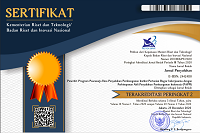Partisipasi Petani dalam Pembangunan Pedesaan di Kabupaten Konawe
Abstract
This study is proposed in answering to the question of “What types of partisipation do farmers give in developing Rurals Areas in Regency of Konawe”. This study was conducted in the rural areas of farmers who have joined in farmer groups, included outlying rural areas and swasembada rural areas in the Regency of Konawe. Technique of choosing samples was carried out by ”cluster purposive sampling”, i.e., firstly, population is grouped based on regions/rural areas, then 5 respondents are chosen purposively from every farmer (member of farmer group) who have been choosen from 10 rural areas. Finally, 50 samples of respondents are chosen (farmers who are members of farmer group). Data collection was undertaken by three methods, they are: (1) indepth observation, (2) indepth interview, and (3) focus group discussion (FGD). Questions on the implementation of rural area development in list of questionnaire forms are formulated into three stages of categories; they are full participation (PP) with score 3, partly/moderate participation (PS) with score 2, and less participation with score 1. The result shows that type of farmers participations mostly are categorized into partly/moderate participation, that is 72 percent, and the rest, respectively, are 10.66 percent for full participation and 17,34 percent for less participation. Types of participations in developing rural areas in Regency of Konawe were carried out through three models of participation approach, i.e., farmer participation in developing means and infrastructure of rural areas, participation in strengthening sosio-economical rural areas, and participation in improving output of rural area farming. In conclusion, opportunity, competence, and willingness of farmers to take part in developing rural areas are very low because of the barrier of social system from elite groups in rural areas, as well as it is mostly influenced by the dependence of government program realization, as well as social mobilization which is most familiar in rural communities. Therefore, farmers are given few opportunities actively and really in developing their rural areas.
Keywords: farmer participation, rural development, social and community prosperity
Downloads
Authors who publish with this journal agree to the following terms:
- Authors retain copyright and grant the journal right of first publication with the work simultaneously licensed under a

This work is licensed under a Creative Commons Attribution 4.0 International License that allows others to share the work with an acknowledgement of the work's authorship and initial publication in this journal. - Authors are able to enter into separate, additional contractual arrangements for the non-exclusive distribution of the journal's published version of the work (e.g., post it to an institutional repository or publish it in a book), with an acknowledgement of its initial publication in this journal.
- Authors are permitted and encouraged to post their work online (e.g., in institutional repositories or on their website) prior to and during the submission process, as it can lead to productive exchanges, as well as earlier and greater citation of published work (See The Effect of Open Access).















